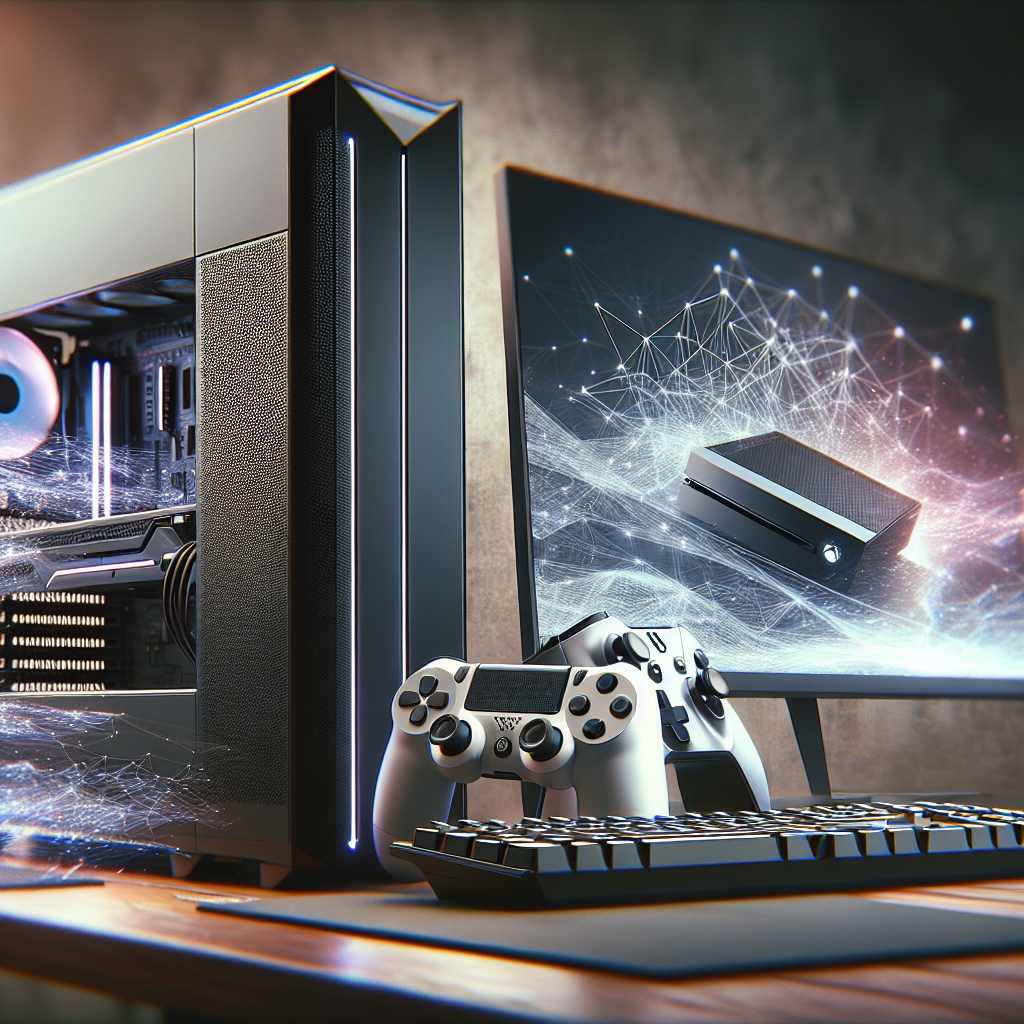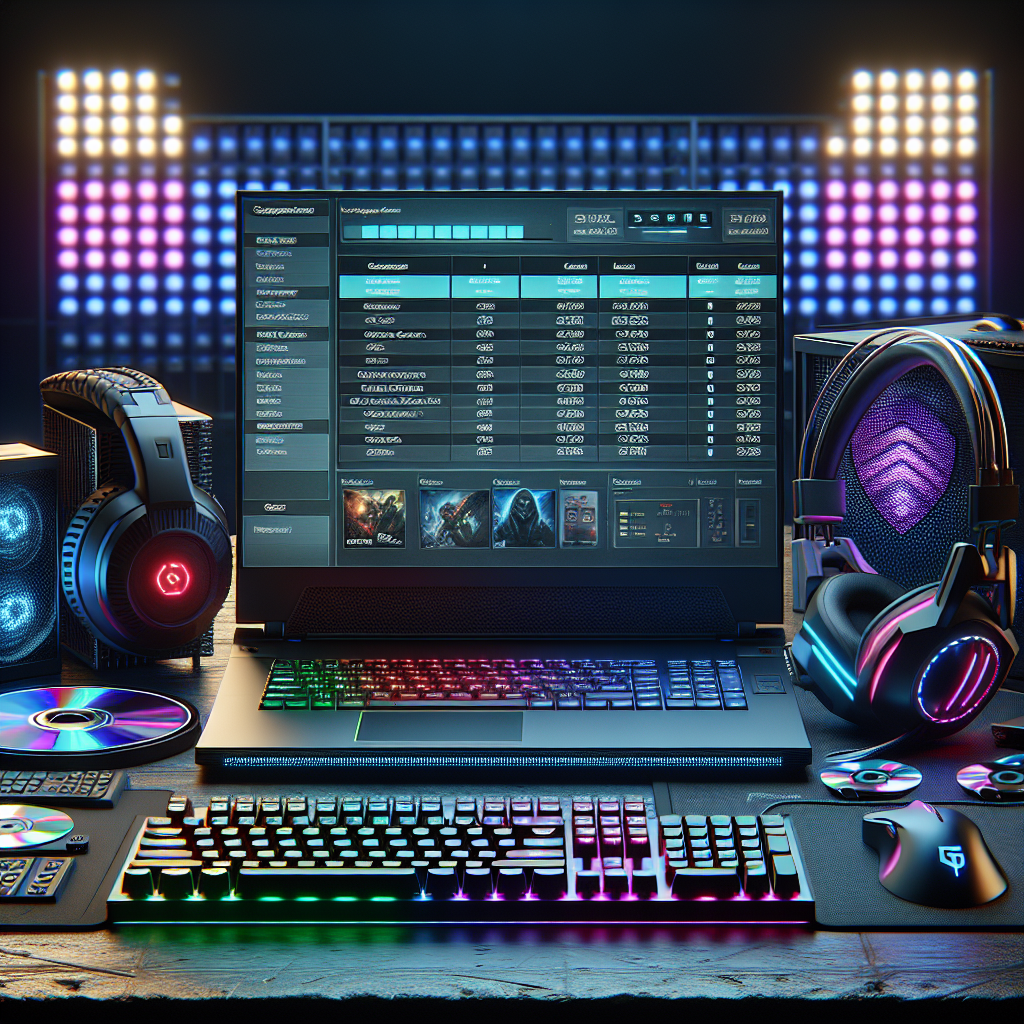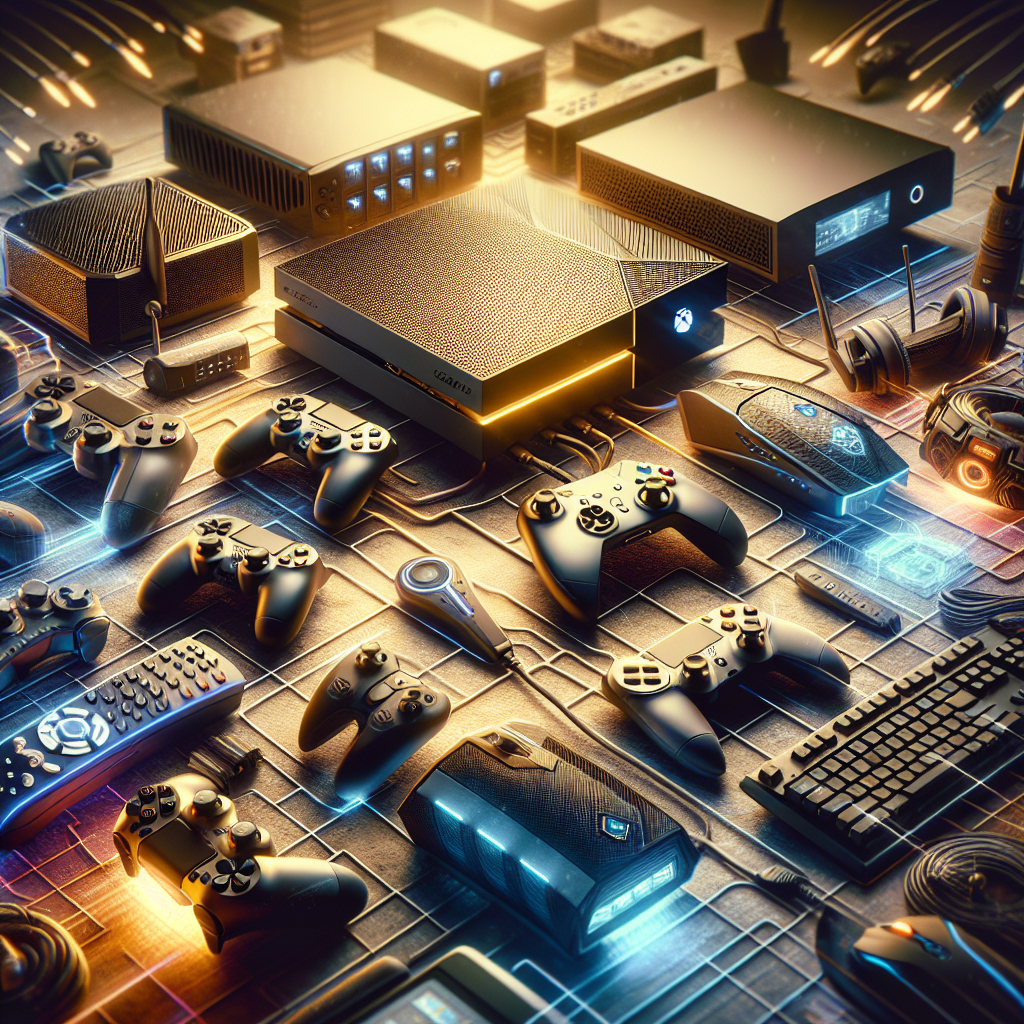In the fast-paced world of online gaming, having the right hardware can make all the difference between victory and defeat. From cutting-edge graphics cards to lightning-fast processors and high-speed internet, the options for enhancing your gaming experience seem endless. This comparison of online gaming hardware aims to break down the latest trends and technologies in the industry, giving you insight into the best gear for conquering virtual battlefields. Whether you’re a casual gamer looking to upgrade your setup or a hardcore competitor seeking that competitive edge, this guide will help you navigate the world of gaming hardware with confidence. Let’s dive in and discover the ultimate tools for success in the digital realm.
Exploring Different Types of Gaming Hardware
Desktop Computers
- Performance: Desktop computers are known for their high performance capabilities due to their larger size and better cooling systems.
- Customization: Gamers can easily customize desktop computers with more powerful components such as graphics cards, processors, and RAM.
- Upgradability: Desktop computers are more easily upgradable compared to other gaming hardware, allowing gamers to keep up with the latest technology.
- Cost: While desktop computers can provide top-notch performance, they are often more expensive than other gaming hardware options.
Laptops
- Portability: Laptops offer the convenience of gaming on the go, allowing gamers to play anywhere they desire.
- Performance: While laptops may not match the performance of desktop computers, high-end gaming laptops can still offer impressive gaming experiences.
- Upgradability: Laptops are generally less upgradable than desktop computers, limiting the ability to improve performance over time.
- Cost: Gaming laptops can be quite expensive, especially for models with top-tier components and features.
Gaming Consoles
- Simplicity: Gaming consoles are plug-and-play devices, making them easy to use for gamers of all skill levels.
- Exclusive Titles: Consoles often have exclusive game titles that are not available on other platforms, attracting gamers looking for specific gaming experiences.
- Cost: Consoles are typically more affordable than high-end desktop computers or gaming laptops, making them a budget-friendly option for many gamers.
- Performance: While consoles may not offer the same level of performance as high-end PCs, they are designed specifically for gaming and can still provide a smooth gaming experience.
Mobile Devices
- Accessibility: Mobile devices such as smartphones and tablets allow gamers to play games anytime, anywhere, with the convenience of a portable device.
- Casual Gaming: Mobile devices are popular for casual gaming experiences, with a wide range of games available on app stores.
- Touch Controls: Gaming on mobile devices often relies on touch controls, which may not be ideal for all types of games.
- Performance: While mobile devices continue to improve in terms of performance, they may not offer the same level of gaming experience as dedicated gaming hardware like desktops or consoles.
Key Factors to Consider in Online Gaming Hardware
Performance
Key Factors to Consider in Online Gaming Hardware
When it comes to online gaming hardware, performance is a crucial aspect that can significantly impact the gaming experience. Several key components contribute to the overall performance of a gaming system, including the Graphics Processing Unit (GPU), Central Processing Unit (CPU), and Random Access Memory (RAM).
- Graphics Processing Unit (GPU): The GPU plays a vital role in rendering graphics and images in games. A high-quality GPU with advanced features can enhance visual details, improve frame rates, and support higher resolutions. When comparing online gaming hardware, consider the GPU’s architecture, clock speed, memory bandwidth, and VRAM capacity to ensure smooth gameplay and realistic visuals.
- Central Processing Unit (CPU): The CPU is responsible for executing instructions and calculations in games. A powerful CPU can boost overall system performance, reduce loading times, and enhance multitasking capabilities. Look for CPUs with multiple cores, high clock speeds, and efficient thermal management to handle the demands of modern online games effectively.
- Random Access Memory (RAM): RAM plays a critical role in storing temporary data and assets for quick access by the CPU and GPU. Sufficient RAM capacity is essential for seamless gameplay, faster loading times, and multitasking without performance bottlenecks. Consider the RAM speed, latency, and capacity when comparing online gaming hardware to ensure optimal system performance during intense gaming sessions.
Connectivity
When comparing online gaming hardware, one of the crucial aspects to consider is connectivity. This can significantly impact your gaming experience in terms of speed, reliability, and overall performance. Two main options for connectivity are Ethernet and Wi-Fi.
- Ethernet vs. Wi-Fi:
- Ethernet: Known for its stability and consistency, Ethernet connections provide a direct link to your network through a physical cable. This can result in lower latency and faster speeds compared to Wi-Fi. For online gaming where every millisecond counts, Ethernet is often preferred for its reliability.
- Wi-Fi: While Wi-Fi offers the convenience of wireless connectivity, it may introduce more latency and potential interruptions due to signal interference or distance from the router. However, modern Wi-Fi technology such as Wi-Fi 6 can provide faster speeds and improved stability for gaming.
- Latency and Ping Rates:
- Latency: Refers to the delay between your actions in the game and the response on the screen. Lower latency is crucial for online gaming as it can impact your ability to react quickly in fast-paced games.
- Ping Rates: Ping is a measure of the time it takes for data to travel from your device to the game server and back. Lower ping rates indicate a more responsive connection, leading to smoother gameplay and reduced lag.
Considering these factors, prioritizing a stable and fast connection through Ethernet or utilizing advanced Wi-Fi technology can enhance your online gaming experience and give you a competitive edge in multiplayer games.
Display
When comparing online gaming hardware, the display is a crucial aspect that greatly impacts the gaming experience. Two key factors to consider when evaluating displays for online gaming are Monitor Refresh Rates and Resolution and Panel Technology.
Monitor Refresh Rates
Monitor refresh rates refer to how many times per second the screen refreshes the image displayed. A higher refresh rate results in smoother motion and reduced motion blur, which is particularly important for fast-paced online games. Many gamers prefer monitors with a refresh rate of 144Hz or higher for a more responsive and immersive gaming experience.
Resolution and Panel Technology
The resolution of a monitor determines the clarity and level of detail in the displayed image. For online gaming, a higher resolution such as 1440p or 4K can provide sharper visuals and more immersive gameplay. However, it’s essential to consider your system’s graphics capabilities and the demands of the games you play, as higher resolutions require more powerful hardware to maintain smooth performance.
In addition to resolution, the panel technology used in a monitor can also impact the gaming experience. Common panel types include Twisted Nematic (TN), In-Plane Switching (IPS), and Vertical Alignment (VA). Each panel technology has its strengths and weaknesses in terms of color accuracy, response times, and viewing angles. Gamers often prioritize fast response times and minimal input lag, making TN panels popular for competitive gaming, while IPS panels are favored for their superior color reproduction and wider viewing angles. VA panels offer a balance between the two, making them a versatile choice for gaming enthusiasts looking for a middle ground.
Popular Gaming Hardware Brands in the Market

Among the array of gaming hardware brands available in the market, several stand out for their quality, performance, and innovation. Below are some of the most popular gaming hardware brands that are highly sought after by online gamers:
- ASUS: Known for its high-quality components and cutting-edge technology, ASUS offers a wide range of gaming hardware including motherboards, graphics cards, monitors, and laptops. Their Republic of Gamers (ROG) series is particularly renowned for its premium quality and performance.
- MSI: MSI is another well-established brand in the gaming hardware industry, recognized for its gaming laptops, motherboards, and graphics cards. The company is praised for its focus on providing top-notch gaming experiences through innovative designs and high-performance components.
- Razer: Razer is synonymous with gaming peripherals and accessories, offering a diverse range of products such as gaming mice, keyboards, headsets, and laptops. The brand is popular among gamers for its sleek designs, customizable features, and advanced technology tailored for gaming enthusiasts.
- Alienware: A subsidiary of Dell, Alienware specializes in gaming PCs, laptops, and peripherals targeted towards hardcore gamers. Alienware is celebrated for its futuristic designs, powerful hardware configurations, and immersive gaming experiences, making it a preferred choice for many online gamers looking for top-tier performance.

Real-World Testing and Reviews
When it comes to comparing online gaming hardware, real-world testing and reviews play a crucial role in providing valuable insights for consumers. This section focuses on the practical evaluation of gaming hardware in actual gaming scenarios.
- Benchmarking Online Gaming Performance
Conducting benchmark tests on various online games is essential to objectively compare the performance of different gaming hardware. By measuring factors like frame rates, latency, and graphical fidelity during gameplay, reviewers can provide quantitative data to support their assessments.
Real-world benchmarking involves running popular online games on different hardware configurations and settings to assess how well they perform under typical gaming conditions. This process helps users understand the capabilities of each hardware component and how they contribute to overall gaming performance.
- User Reviews and Recommendations
User reviews and recommendations offer valuable insights into the practical usability and satisfaction levels of online gaming hardware. By aggregating feedback from a diverse range of gamers, reviewers can provide a comprehensive overview of the strengths and weaknesses of each hardware product.

Analyzing user experiences with specific gaming hardware can help potential buyers make informed decisions based on factors like reliability, durability, ease of use, and customer support. User recommendations often highlight the real-world performance of gaming hardware in different gaming genres and settings, offering personalized insights for prospective users.
Budget-Friendly Options for Online Gaming Hardware
When looking for budget-friendly options for online gaming hardware, there are several choices available that cater to different levels of gaming experience and performance needs.
Entry-Level Gaming Devices
- Console Gaming: Entry-level gaming consoles like the PlayStation 4 Slim or the Xbox One S provide a cost-effective way to enjoy online gaming with a wide selection of games.
- Budget Gaming PCs: Pre-built gaming PCs such as those from companies like CyberPowerPC or SkyTech offer decent performance for online gaming at an affordable price point.
- Gaming Laptops: Entry-level gaming laptops like the Acer Nitro 5 or the Lenovo Legion Y540 provide portability and gaming capability without breaking the bank.
Mid-Range Gaming Hardware
- Upgraded Console Models: Mid-range console models like the PlayStation 4 Pro or the Xbox One X offer enhanced performance and graphics for a slightly higher price than entry-level options.
- Custom-Built Gaming PCs: Building a custom PC with mid-range components from brands like AMD or NVIDIA can provide a balance of performance and affordability.
- Gaming Monitors: Investing in a mid-range gaming monitor with features like higher refresh rates and lower response times can enhance the gaming experience without a significant cost increase.
High-End Gaming Setups
- Flagship Console Versions: High-end console versions like the PlayStation 5 or the Xbox Series X/S deliver top-of-the-line performance and graphics for online gaming enthusiasts willing to invest in premium hardware.
- Custom-Designed Gaming PCs: Building a high-end gaming PC with top-tier components such as Intel Core i9 processors and NVIDIA RTX graphics cards ensures unparalleled gaming performance for demanding online titles.
- Gaming Peripherals: High-end gaming peripherals like mechanical keyboards, gaming mice, and surround sound headsets can complement a high-end gaming setup for a fully immersive experience.
Future Trends in Online Gaming Hardware
As technology continues to advance at a rapid pace, the future of online gaming hardware is set to undergo significant transformations to enhance the gaming experience for users. Several key trends are emerging in the realm of online gaming hardware:
- Virtual Reality Integration
Virtual reality (VR) technology is poised to revolutionize the online gaming industry by offering immersive and interactive gameplay experiences. Hardware manufacturers are increasingly focusing on developing VR-compatible devices such as headsets, controllers, and sensors to enable gamers to fully immerse themselves in virtual worlds. The integration of VR technology into online gaming hardware is expected to drive the demand for more powerful and sophisticated gaming systems capable of rendering high-quality graphics and delivering seamless gameplay.
- Cloud Gaming Services
Cloud gaming services are gaining popularity among gamers as they offer the convenience of accessing a vast library of games without the need for expensive hardware upgrades. By leveraging cloud-based servers to process and stream games to users’ devices, cloud gaming services eliminate the constraints imposed by hardware limitations, enabling gamers to enjoy high-quality gaming experiences on a variety of platforms. The future of online gaming hardware is likely to witness an increased emphasis on cloud gaming services, with hardware manufacturers exploring ways to optimize their devices for seamless integration with cloud gaming platforms.
- Advancements in Gaming Technology
The relentless pursuit of technological innovation in the gaming industry is driving advancements in online gaming hardware, paving the way for more sophisticated and powerful gaming systems. From faster processors and high-resolution displays to advanced cooling systems and customizable peripherals, hardware manufacturers are continuously pushing the boundaries of gaming technology to deliver unparalleled gaming experiences. The future of online gaming hardware is characterized by a focus on enhancing performance, increasing efficiency, and catering to the diverse needs of gamers across different genres and platforms.
FAQs: Online Gaming Hardware Comparison
What is online gaming hardware comparison?
Online gaming hardware comparison is the process of evaluating and comparing different gaming hardware such as gaming consoles, gaming PCs, controllers, and headsets, to determine which ones are best suited for online gaming. This can help gamers make informed decisions when purchasing new gaming equipment.
Why is it important to compare online gaming hardware?
Comparing online gaming hardware allows gamers to determine which devices will provide the best gaming experience based on their preferences and budget. This can help gamers optimize their gaming setup for better performance, graphics, sound quality, and overall enjoyment while playing online.
How can I compare online gaming hardware effectively?
To compare online gaming hardware effectively, it is important to consider factors such as processing power, graphics capabilities, storage capacity, compatibility with online gaming platforms, and user reviews. Researching and reading reviews from reputable sources can also help you make informed decisions when comparing gaming hardware.
Are there any websites that specialize in online gaming hardware comparison?
Yes, there are several websites and forums dedicated to comparing and reviewing online gaming hardware. Some popular websites for online gaming hardware comparison include Tom’s Hardware, PC Gamer, and IGN. These websites provide detailed reviews, comparisons, and expert opinions on the latest gaming hardware.
What are some common mistakes to avoid when comparing online gaming hardware?
Some common mistakes to avoid when comparing online gaming hardware include relying solely on brand names, ignoring user reviews, overlooking compatibility with gaming platforms, and overlooking important features such as graphics capabilities and processor speed. It is important to do thorough research and consider all factors when comparing gaming hardware.


